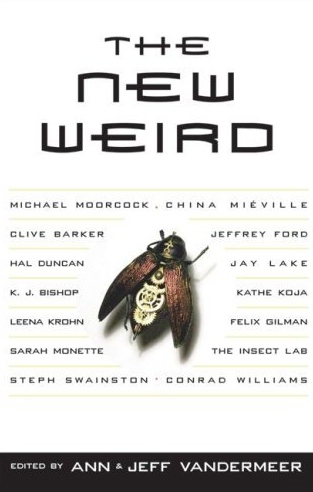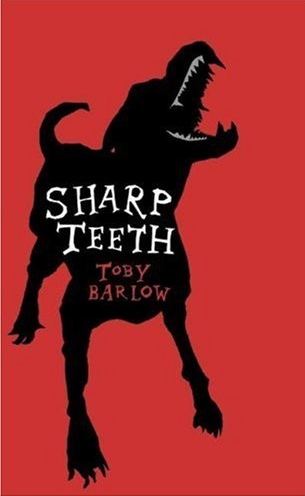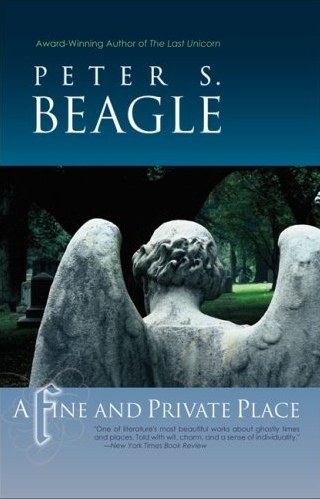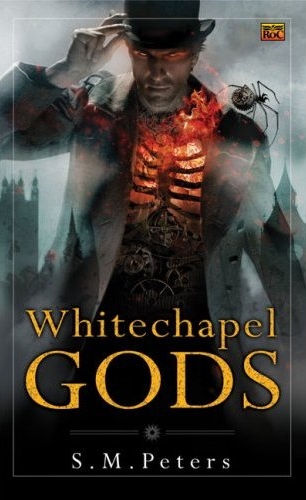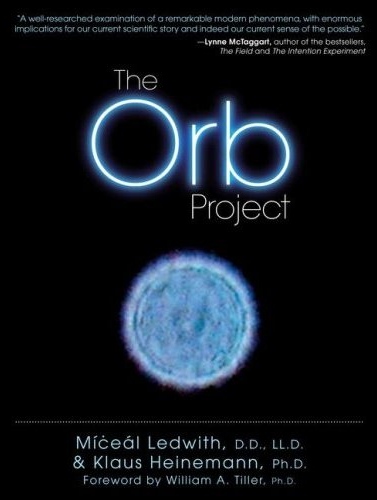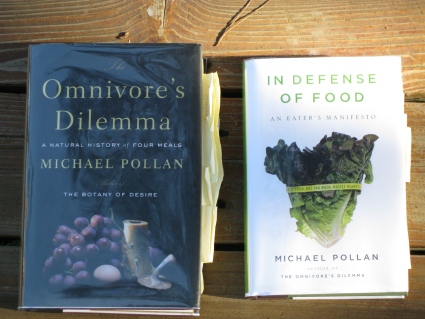|
|
|
|
This Just In...News
From The Agony Column
|
| |
|
01-25-08: Jeff and Ann VanderMeer Meet 'The New Weird' ; NPR First Book
Series : Michael Harvey on Weekend Edition Sunday, January 27, 2008
|
Not the Same
As the Old Weird
I suppose that I
thought there had already been a "new weird" anthology; in
retrospect, I guess I was thinking of 'Conjunctions'. The New Weird's
been around long enough that some of the folks who built the bandwagon
are eager to jump off it. And now 'The New Weird' (Tachyon Publications
; March 2008 ; $14.95) edited by Ann and Jeff VanderMeer gives
them a well-defined bandwagon from which to jump.
'The New Weird' is not simply an assemblage of stories that Ann and Jeff
felt would fit under the rubric of "New Weird"; it's more of a
historic and critical document of a literary movement, a book that gives
shape and literally gives meaning to the term "New Weird". There
are five parts to the book; and I talked to the VanderMeers about all of
them in an interview you
can hear via this link to the MP3.
Eschewing Jeff's usual playful or metafictional tone, the VanderMeers begin
the book with a serious, even scholarly discussion of what the New Weird
is, what its precedents were and where it points to the future. This is where
you're going to find a one-paragraph, this-is-it definition of The New Weird.
Then the fiction begins; first with a section that the VanderMeers call (at
least in the ARC) "Stimuli", that is, examples of The New Weird
that appeared well before the literary movement even had a chance to think
about naming itself. Here you'll find vintage M. John Harrison, Clive Barker,
Michael Moorcock and the heretofore-unknown-to-me Simon D. Ings. (And that's
why you buy these anthologies, right?)
Then you get the "Evidence," the pure thing, the real deal, concluding
with what Jeff suggested was an example of "the Next Weird"; an
original story by Alastair Rennie. Following on the fiction, there's "Discussion",
which includes postings from The Third Alternative discussion boards (wherein
M. John Harrison suggested the name "the New Weird" [though China
Miéville and Steph Swainston also may have come up with the term as
well]) and essays by Michael Cisco, K. J. Bishop and a fascinating set of
responses from a variety of European editors.
Finally, in the name of formal experimentation, something associated – not
always positively – with the New Wave science fiction writers of the
60's and 70's, there's a "Laboratory," a round robin collaboration
between a group of New Weird writers. All fascinating stuff, and top-notch;
another must-buy anthology. More importantly, an anthology from which one
could quite easily teach a class, because this is stuff that people need
to know about.
So it happens that there wasn't a New Weird anthology until now. Just in
time to introduce the Next Weird. All on board the Next Weird bandwagon,
folks; just make sure you're ready to bail well before whatever comes next
gets a name.
|
NPR First Book
Series : Michael Harvey on Weekend Edition Sunday, January 27,
2008
 |
Assuming that there
are no newscape-devouring events between now and Sunday morning, NPR
and the wonderful Liane Hanson will be running my report on First Book
author Michael Harvey ('The
Chicago Way') this Sunday on Weekend
Edition Sunday. I have to say that Harvey was such a great -- and
very "regular", as it were guy, that his story really resonated
with me and I think it's a first book story that lots of readers will
share. Fifty pages of a novel in a drawer – it's an American
Heritage, isnt it? At the present time, I dont know when
in the program it will run, except that it is scheduled, I believe,
to run in the general vicinity of their Cybercrime series. As I hear
more, I'll post updates for you, and they'll occur as late as Sunday
morning. So do check back!
Readers on occasion ask what they can do to support this website and podcast;
well the biggest help you can give me is to go to NPR's website when the
stories run and use the Email this story button to email the story to as
many people as you can. Of course, you can also email NPR and ask for them
to set me up with an hourlong weekly show based on this podcast. Also, because,
hell, ask yourself, how many people do you know who have fifty pages in a
drawer – beyond yourself, that is?
Update:
Here's the link for the NPR Story on Michael Harvey; use the email this story
button early and often!
|
| |
|
01-24-08 : Toby Barlow Has 'Sharp Teeth' ; Agony Column Podcast News Report
: Peter S. Beagle Interviewed at SF in SF January 19, 2008 ; Laurie King
Live Interview Tomorrow 10:07 AM to 11 AM PST at KUSP : Email Your Questions or Call In
|
Blank Verse
Werewolf Epic
|
|
A
nice book, issued sans DJ. Very pretty and cool to read.
|
Hopefully most of
us read the blank-verse epics in high school or college; 'Doctor Faustus'
or John Milton's 'Paradise Lost,' recently-re-issued
in a wonderful volume containing his poetry and prose. There's
a reason theyre called classics; theyre still powerful
texts today, in spite of subjects that go well beyond the confines
of realistic fiction. 'Doctor Faustus,' for example, could well be
pigeonholed today as "mere" genre fiction, since it involves
a deal with the devil. Likewise 'Paradise Lost,' what with Satan presenting
such an appealing anti-hero. But theyre both still readable
as well. They have exciting plots, great characters and lots of action.
So dont write off 'Sharp Teeth' (Harper Collins ; January 29, 2008
; $22.95) by Toby Barlow, just because it is an epic story of love and werewolves
set in Los Angeles and written in blank verse. Indeed, 'Sharp Teeth' might
be seen as pretty straightforward mimetic realism by some who have lived
in LA and experienced the werewolves there firsthand. Instead, give the book
the pick-it-up-and-start-reading test, and your thought wont be, "Why
is this written in blank verse?" You'll wonder instead why more books
aren't written in blank verse.
'Sharp Teeth' is a fairly intense novel about werewolves in love and the
pretty damn awful state of our cities – with line breaks. Anthony is
a dogcatcher looking for more money to make ends meet. Clearly that requires
sharp teeth these days. When he meets a girl at a bar, she ends up buying
his drink. But that's not real inequality; it's the fact that she's a werewolf
which tips the tables. She's left her pack behind, and in werewolf terms
that's like yanking the sun from the center of the solar system. Gravity's
not going to make what happens pretty. Following lots of violence, lots of
blood will be spilled – in blank verse.
The effect of the blank verse as a storytelling medium is fascinating; it
both confines and liberates the reading experience. Barlow's got the chops
to bring just enough epic, literary feel to the proceedings before he grounds
things in the gritty underworld of beings that can shift shape at will and
who are recruiting from the homeless to add to their ranks. You'll find the
pages turning faster than you expected. For me at least, the reading experience
was akin to that of reading a graphic novel, with the line breaks standing
in for the graphics as a means of up-pacing the narrative. No matter what
the subject, it's really interesting to just read the form.
'Sharp Teeth' is probably going to scare away readers it shouldn't. If you
hesitate at the mention of blank verse, get over it; reading the book will
aid in that quest. And perhaps, if youre lucky, you may take another
look at those older epics; deal with the devil journey to hell. Pretty damn
tight stories, big plots, lots of action. Sharp teeth, indeed.
|
Agony Column
Podcast News Report : Peter S. Beagle Interviewed at SF in SF January
19, 2008 : "Fantasy occurs, really, in the corner of the eye"
|
|
The
Tachyon Publications re-issue of the classic.
|
It's funny how things
work out. You finally get to talk to Peter S. Beagle, and you find
out that he used to be a substitute DJ at the NPR affiliate which hosts
your weekly radio show. When I finally caught up with Beagle, after
SF in SF had finished, he was ready to talk about his old alma mater,
and a bit more besides. You
can hear the MP3 from this link, and hear why he was a DJ. For
radio, as well as fantasy, he certainly has the voice.
|
Laurie King Live Interview Tomorrow Friday Jan 25 10:07 AM to 11 AM PST
at KUSP : Email Your Questions or Call In
I thought it best
to remind readers and listeners that, assuming the power is on at the
station, I'll be interviewing Laurie R. King tomorrow, live,
on the radio, available via the Internet at kusp.org/live, from 10:07 AM
until around 11 AM PST. Email me your questions -- I already have some
-- hear your name over the radio and Ms. King's response as well. Or, you
can call the station, at 831-476-2800, or (in California, at least) at
1-800-655-5877. I've already heard from some readers, and I hope to hear
from more – and actually hear more, on Friday.
|
| |
|
01-23-08: S. M. Peters Worships 'Whitechapel Gods' ; Agony Column Podcast
News Report: SF IN SF for January 19, 2008 : A Conversation With Mark
J. Ferrari
|
Steampunk Revolution
The rich aroma
of American Cheese permeates the air today, as I finally get to write
about 'Whitechapel Gods' (Roc / NAL / Penguin Putnam ; February 8,
2008 ; $6.99), a delightful mass market paperback debut by S.
M. Peters. Clear the transom before you pick up this book,
because its going to force you to shove everything else aside
and pay attention to it. It's clever, fun, intense and imaginative.
Set in a London we should hope never to know, 'Whitechapel Gods' begins with
a literally searing vision of horror. Mama Engine and Grandfather Clock have
sealed off Whitechapel from the rest of the city and made it their own. Humans
tried to fight them – and even called it The Uprising, but to no avail;
the Boiler Men made short work of them. Now a new disease is spreading in
the city; regular folks call it the clacks, and it involves machinery growing
inside people with decidedly unpleasant results. Hopes for overthrowing Mama
and Grandfather are born anew. Nobody will be unscathed.
Peters has a great sense of visual splendor, and uses it to bring the grimy,
grotty streets of London to life, or more often, death. Horror aficionados
will just love 'Whitechapel Gods'. It's chock-a-block with inventive mechanical
mayhem, filled with gruesome set-pieces that are as conceptually smart as
they are viscerally rendered. But what sets this novel apart is the sense
of wholeness, the single-mindedness that the author brings to his creation.
There's no sense that this is a Frankensteinian pastiche, cut-and-pasted
from other authors. Peters' vision is unchecked, undiluted and untamed. 'Whitechapel
Gods' creates a whole world you can visit in your mind. Not that youd
want to live in this world mind, you, but it's a hell of a fun place to visit.
So long as the Boiler Men don't knock on your door.
There's a lot to like about 'Whitechapel Gods, and not least is the fact
that it's been issued with so little fanfare. There's something very appealing
about the low-key nature of this book. The cover illustration – for
which I can find no credit – is remarkably effective. There are no
blurbs, which is refreshing, and just fine. I believe that anybody who thinks
they might be interested in a book titled 'Whitechapel Gods' will find themselves
thrilled to pieces with what they find in these pages. It lives up to any
promises I can make for it and beyond. While I'm a fan of hardcover books
and limited editions and all the foofaraw of specialty publishing, it's actually
books like this that this column was created to find. American Cheese – cheap
paperback with gaudy covers and lurid stories that just happen to be damn
fine writing – to my mind, this is what makes reading exciting. This
book looks like just about any other cheap and tawdry piece of paperback
science fiction. But 'Whitechapel Gods' is the sort of cheap and tawdry science
fiction / horror / steampunk fantasy that you might put on a shelf next to
your paperback original of 'Do Androids Dream of Electric Sheep', 'King Rat'
or 'Neuromancer'. Cheap packaging somehow manages to accentuate raw talent.
|
Agony Column
Podcast News Report: SF IN SF for January 19, 2008 : A Conversation
With Mark J. Ferrari : Words and Pictures
SF
in SF is off to roaring start for 2008. The guests for Saturday,
January 19, 2008 were Peter S. Beagle and Mark J. Ferrari, and both
were incredibly entertaining. The first podcast from the show will
be my interview with Mark J. Ferrari, author of 'The Book of Joby'.
I talked to Ferrari between the reading and the panel discussion, and here's
a link to the MP3 file of that interview. You can see why Tor sent
him on tour; he's clearly a guy who will help sell his own book the
old fashioned way, by being interesting, intelligent and well-spoken.
Stay tuned for lots more podcasts from this show, but more importantly,
if youre in town when the next one rolls around, do take advantage
of this great opportunity. The shows are free, they serve drinks in
a plush little movie theater, you can get books signed and even buy
books on the spot. I think the buying thing is a plus, because nobody
can ever have too many books.
|
| |
|
01-22-08: Míceál
Ledwith and Klaus Heinemann Unveil 'The Orb Project'
|
A Conversation
With Míceál Ledwith at Gateways Books and Gifts
|
|
Is
it in the eye of the beholder or itself a beholder?
|
There was no
way I was going to miss the opportunity talk with Míceál
Ledwith, [pronounced Me-haul] who with Klaus Heinemann
authored 'The Orb Project' (Beyond Word Publishing / Atria Books
/ Simon & Schuster
; November 6, 2007 ; $18.95). I actually ended up going directly
from my chat with Michael Pollan over to Gateways
Books and Gifts so that I had at a least a few minutes with
the man who had a collection of over 150,000 photographs of Orbs – which
he and many others believe to be intelligent spiritual entities
that have something to say to us mere humans.
Ledwith
told me about the various levels of reality that each variety
of Orb inhabits, and explained how he knows that they are not
merely dust motes on the lens. The book itself is filled
with gorgeous and occasionally frightening photographs, and it's
essentially two books between one set of covers. Each writer
takes about 90 pages to give his perspective on the phenomenon;
they have very different approaches. Lediwth is a theologian,
and his perspective is spiritual, as was his journey from being
part of a commission that advised Pope John Paul II to his current
work with orbs. Heinemann is a physicist, and his journey is
one of theory. Together, they give a thorough look at this very
strange phenomenon.
You don't have to believe that these images are indeed spirits that inhabit
other levels of reality to find their presence and discussion of interest.
For me, I find the people who discuss them – and what they have to
say about them – as fascinating as the various theories put forward
to describe, and yes, dismiss them. We live in a reality that is difficult
to share with others, and photographs are one this world's best ways of
bridging the gap from one person to the other. And perhaps from one reality
to another as well.
|
| |
|
01-21-08: A 2008 Interview With Michael Pollan
|
"This a food that's left the realm of food"
|
|
Michael
Pollan at the J-School studios in Berkeley. |
Sure, I'm on a food
binge. But not what is usually meant when one hears the words "food" and "binge" put
together.
Readers can't but help having noticed the cookbooks creeping into The
Rolling Shelves, and the increasing number of food-related books that
have come my way. A couple
of weeks ago, I ran the panel I conducted
with Michael Pollan, Mollie Katzen and Ann Vileisis; this week, I had
the pleasure of speaking with Mr. Pollan before his appearance at Capitola
Book Café.
|
|
Note
the forest of stickies in each book.
|
Let me first emphasize that for all the wonderful, scare-ifying facts
that Pollan pulls out in 'The Omnivore's Dilemma' and 'In Defense of
Food', the real strength of both works is his top-notch prose, which
manages to be painfully clear while cheerfully observing the absurdity
that is the Western Diet. The books are constantly entertaining on a
reading-the-words level as well as a the-facts-the-words-are-conveying
level. Well written and easy-to-read, they are nonetheless quite different.
'The Omnivore's Dilemma' is a trip down the rabbit hole of where your
food comes from – and why. The book accurately reflects the subject,
which means it's a journey from the table back to the farm, via some
places you might not expect to visit or look as they look. Pollan takes
apart four different meals, tracing each part of the meal back to where
it came from. He visits factory farms and the incredible Polyface Farms,
a truly organic operation. Even though Pollan is going to tell you things
youd prefer not to know, you'll be glad to know them and glad
you got the facts in a manner as engaging as the facts are alarming.
'In Defense of Food : An Eater's Manifesto' is a carefully constructed
polemic, a cri de coeur for more sensible eating. It's short, snappy
and crystalline where 'The Omnivore's Dilemma' is dark, long and labyrinthine.
But it's equally funny. Don't read it too fast.
I talked with Mr. Pollan about both books, following the common threads
from one to the next. You
can hear the MP3 of the interview from this link. But I must warn you that if you listen in your car, while eating
and driving, you may find your appetite for fast food is diminished.
For which you'll wish to thank Mr. Pollan.
|
| |
|
|
